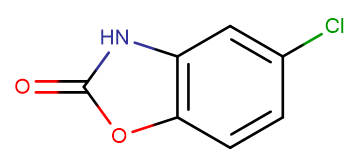
Chlorzoxazone
CAS No. 95-25-0
Chlorzoxazone( NSC 26189 )
Catalog No. M16810 CAS No. 95-25-0
Chlorzoxazone is a centrally acting muscle relaxant used to treat muscle spasm and the resulting pain or discomfort.
Purity : >98% (HPLC)
 COA
COA
 Datasheet
Datasheet
 HNMR
HNMR
 HPLC
HPLC
 MSDS
MSDS
 Handing Instructions
Handing Instructions
| Size | Price / USD | Stock | Quantity |
| 500MG | 38 | In Stock |


|
| 1G | Get Quote | In Stock |


|
Biological Information
-
Product NameChlorzoxazone
-
NoteResearch use only, not for human use.
-
Brief DescriptionChlorzoxazone is a centrally acting muscle relaxant used to treat muscle spasm and the resulting pain or discomfort.
-
DescriptionChlorzoxazone is a centrally acting muscle relaxant used to treat muscle spasm and the resulting pain or discomfort. It acts on the spinal cord by depressing reflexes.Chlorzoxazone is currently being used as a marker substrate in vitro/vivo studies to quantify cytochrome P450 2E1 (CYP2E1) activity in humans.
-
In Vitro——
-
In Vivo——
-
SynonymsNSC 26189
-
PathwayCell Cycle/DNA Damage
-
TargetPotassium Channel
-
RecptorPotassium Channel
-
Research AreaInflammation/Immunology
-
Indication——
Chemical Information
-
CAS Number95-25-0
-
Formula Weight169.57
-
Molecular FormulaC7H4ClNO2
-
Purity>98% (HPLC)
-
SolubilityEthanol: 34 mg/mL (200.5 mM); DMSO: 34 mg/mL (200.5 mM)
-
SMILESC1=CC2=C(C=C1Cl)NC(=O)O2
-
Chemical Name5-chloro-3H-1,3-benzoxazol-2-one
Shipping & Storage Information
-
Storage(-20℃)
-
ShippingWith Ice Pack
-
Stability≥ 2 years
Reference
1.Dong DL, et al. Eur J Pharmacol. 2006 Sep 18;545(2-3):161-6.
molnova catalog



related products
-
BMS-919373
BMS-919373 is a potent I(Kur)/Kv1.5 channel blocker with IC50 of 50 nM.
-
Mitiglinide calcium ...
An insulin secretion stimulator by closing the ATP-sensitive potassium KATP channels in pancreatic β cells.
-
PF-04895162
PF-04895162 (ICA-105665, PF 4895162) is an orally available agonist of neuronal Kv7 potassium channel, opens Kv7.2/7.3 and Kv7.3/7.5 potassium channels.



 Cart
Cart
 sales@molnova.com
sales@molnova.com


